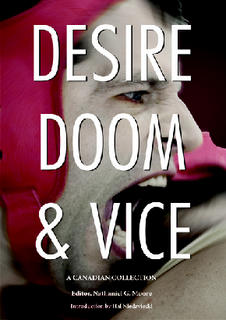 No, this is the title of a new anthology of Canadian prose and poetry, not the current state of life in London. The editor is that curious creature, the multi-talented peacock-provocateur, Nathaniel G. Moore, who has been a force in fusing poetry and performative entertainment for some time now, mainly in Ontario, in a manner altogether his own.
No, this is the title of a new anthology of Canadian prose and poetry, not the current state of life in London. The editor is that curious creature, the multi-talented peacock-provocateur, Nathaniel G. Moore, who has been a force in fusing poetry and performative entertainment for some time now, mainly in Ontario, in a manner altogether his own.I am not sure I agree with all his methods or fin-de-siecle sequins, but his writing is sometimes quite good, and his energy to be admired, if not siphoned off.
Moore's new book, Desire Doom & Vice: A Canadian Collection, from Wingate Press, is that doomed hybrid (see my own In The Criminal's Cabinet), a book of both prose and poetry. I suspect the prose (although by many good contemporary practitioners, such as Catherine Kidd, Corey Frost and George Murray) is mainly there to underwrite the poetry, and help it sell. I am not sure this works. Usually, coupling prose and poetry is like re-enacting the final tussling gasps of the life guard and the drowner; prose that finds itself onboard a poetry book often ends up like the good captain, down with the ship.
However, this is a sexy-looking vessel, with a superb cover, a quintessential Hal Niedzviecki Introduction (the kind he wrote for Short Fuse, which, like an expert legal mind, says everything but nothing about the actual book, in gnomic, brilliant ways) that is maybe the best piece of writing in the book, except for the editor's own bizarre note that seems to be sincere, funny and certifiable at once, and not entirely on topic. One concern - the paper is not up to the quality of the text, and the typography is very wonky in places, as is the font. One hungers for Andy Brown to design every book in the world. Fortunately, they have included work by him instead.
The contributors are (as the saying goes) a veritable who's who from a certain kind of Canadian poetry publication these days (think Matrix): those alternative, indie, hipster types who nonetheless have MAs and impressive publishing credits, and live with parrots; reading the biographical notes one is reminded that, in North America, at the moment, to be a poet is still nearly as "cool" and associated with one aspect of "youth culture" as to be in a band, or run a tattoo parlour. This is not the case in the UK, which, on the one hand, drools over Montreal acts like Rufus Wainwright, but fails to take any notice of the equivalently talented literary figures from MTL. In the UK, poets who are too showy are suspects, and likely to be terminated with Scotland Yard efficiency. Mr. Moore would be too camp and Wildean to survive in an environment that only allows hothouse flowers to bloom if they have Hugh Grant accents and went to Oxbridge. I digress.
One of my poems in this book has a very odd typo in it that adds a few words not intended to be there (by me at least). I won't mention which poem, but if you want to write in with your guess, please feel free to try and earn a fabled Marvel no-prize. In a troubling way, this improves the poem, even as it detracts. I am glad it happened.
As to the contributors, the list is impressive, and includes: Di Brandt, Jon Paul Fiorentino, Jennifer LoveGrove, L.E. Vollick, Paul Vermeersch, Anne Simpson and John Stiles. Simpson seems to be odd woman out here, as her work is far more polite and "worthy" (usually) than that of many of the daringly louche divas of the demi-monde she is to be found among - though this is not to cast aspersions, simply to note disparities in style and intent.
This book is the little sister of the latest Gargoyle which I mentioned a fortnight or so ago, which features many equivalently thrilling and oddball American fringe writers. In the UK, where there is more concern with propriety, most poets are too cautious with their careers, and their reps, to dare to write such loose, crass, funny, troubling and blunt stuff as can be found in this book. In some ways then, a corrective, if one's course seeks to deviate.
Comments